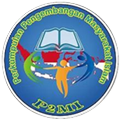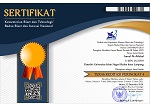Strengthening the Rural Women's Entrepreneurship Spirit in Facing the Asean Economic Community (Da'wah in the Economic Context of Society)
Abstract
This article reports the results of a study on how to fill the free market program of ASEAN Economic Community (AEC). Indonesia has significant demographic bonus when compared to other ASEAN countries, so that specifically Indonesia will become an easy target for economic activity (read: free market flow transactions) carried out by all members of ASEAN. Demographic bonus is an opportunity and challenge for the Indonesian people, both for those who live in cities or in the countryside. This condition will be more complicated, if the mapping potential of the population does not become a serious concern for the government and stakeholders so that the people of Indonesia will become the largest consumer for products of ASEAN countries. One of the potential populations of Indonesia is women, because they have specific skills that are able to be directed towards an income. The purpose of this study is to prepare the people of Indonesia who have the skills, especially women in entering the AEC both urban and rural communities. This study uses a qualitative method of observation, interviews and review of documents, such as books, newspapers and others.
Full Text:
PDFReferences
Achmad, Nur, and Edy Purwo Saputro, ‘Faktor Sukses Wirausaha Wanita’, JP Feb Unsoed, 2015, 2
Afandi, Moch. Masykur, ‘Peran Dan Tantangan Asean Economic Community (AEC) Dalam Mewujudkan Integrasi Ekonomi Kawasan Di Asia Tenggara’, Spektrum: Jurnal Ilmu Politik Hubungan Internasional, 8 (2011), 2
Aimasari, Nina, Astri Ghina, Universitas Telkom, Woman Entrepreneur, and Factor Analysis, ‘Analisis Faktor-Faktor Yang Memotivasi Wanita Untuk Menjadi Wirausaha (Studi Pengusaha Wanita UMKM Di Kota Bandung Tahun 2015)’, E-Proceeding of Management, 2 (2015), 2795–99
Al-Qur’an Al-Karim
Gunadi, Ariawan, ‘ASEAN Economic Community Impact for Indonesia’, Jurnal Opinio Juris, 19 (2014), 2
Iedarwati, Pradewi, ‘Entrepreneurial Characteristics of Betawi Batik Women Activists’, Journal of Entrepreneur and Enterpreneurship, 6 (2017), 17–24
Kuntowijoyo, Paradigma Islam: Interpretasi Untuk Aksi (Bandung: Mizan, 2010)
Lexy, J. Moleong, Metode Penelitian Kualitatif (Bandung: PT Remaja Rosdakarya, 2014)
———, Metode Penelitian Kualitatif (Bandung: PT Remaja Rosdakarya, 2011)
Munfaqiroh, Siti, ‘Faktor Yang Mempengaruhi Wirausaha Wanita Miskin Untuk Mencapai Keberhasilan Usaha’, Jurnal JIBEKA, 10 (2016), 58
Satori, Dja’man, Metodologi Penelitian Kualitatif (Bandung: Alfabeta, 2011)
DOI: http://dx.doi.org/10.24042/ijpmi.v10i1.2360
Refbacks
- There are currently no refbacks.
Jurnal Ijtimaiyya is licensed under a Creative Commons Attribution-ShareAlike 4.0 International License.






1.png)
11.png)
.png)


